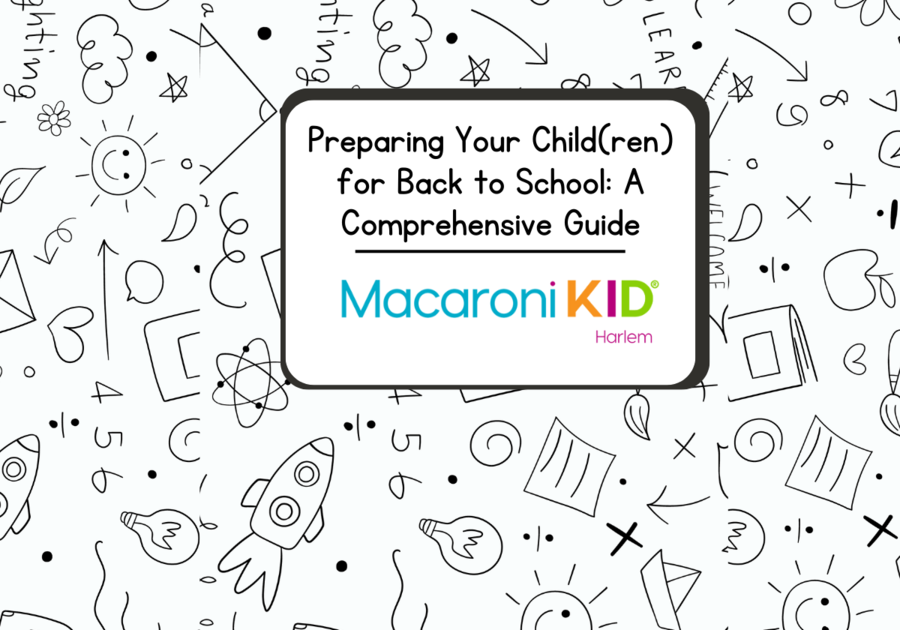As the summer break draws to a close, it's time for parents and guardians to start preparing their children for the back-to-school season. Transitioning from a relaxing summer routine to the structured environment of school can be overwhelming for both parents and kids. However, with careful planning and support, you can ensure a smooth and successful start to the new academic year. Here's a comprehensive guide on how to prepare your child(ren) for back to school:
Re-establish a School Routine:
In the weeks leading up to the first day of school, gradually reintroduce your child to a school routine. Set a consistent bedtime and wake-up time, making sure your child gets enough sleep for their age group. This helps readjust their internal clock to the school schedule and ensures they are well-rested and ready to learn.
Review Academic Skills:
Spend some time reviewing academic skills with your child. Encourage them to read books, solve math problems, or engage in educational activities to prevent the "summer slide" and help them transition back into the learning mindset.
Discuss Feelings and Expectations:
Communicate openly with your child about their feelings and expectations regarding the upcoming school year. Address any concerns they may have and provide reassurance and support. Encourage them to share their excitement or worries, allowing them to feel heard and understood.
Visit the School:
If possible, arrange a visit to the school before the academic year starts. Tour the campus, locate their classroom, and meet their teachers. Familiarizing your child with the school environment can alleviate anxiety and help them feel more comfortable on the first day.
Organize School Supplies:
Go shopping for school supplies together and involve your child in choosing items like backpacks, notebooks, pencils, and other essentials. Organizing their supplies in advance will make them feel more prepared and eager to start the new school year.
Create a Dedicated Study Area:
Designate a quiet and well-lit study area at home where your child can do homework and concentrate on their studies. This dedicated space will reinforce the importance of education and help them stay focused on their tasks.
Establish Healthy Eating Habits:
Ensure your child eats a balanced breakfast before heading to school. A nutritious meal fuels their brain and sets them up for a day of learning. Pack a healthy lunch and snacks if necessary, avoiding sugary and processed foods that can cause energy crashes.
Set Goals and Discuss Priorities:
Encourage your child to set achievable academic and personal goals for the year. Discuss the importance of time management and prioritize their responsibilities, such as completing homework before engaging in leisure activities.
Encourage Independence:
Support your child's growing independence by encouraging them to take responsibility for certain tasks. This could include organizing their backpack, packing their lunch, or setting out their clothes for the next day. These small acts empower them and instill a sense of self-reliance.
Foster a Positive Attitude:
Emphasize the positive aspects of going back to school, such as reuniting with friends, exploring new subjects, and participating in extracurricular activities. A positive attitude will make the transition smoother and more enjoyable for your child.
Practice Healthy Screen Habits:
With the increasing use of technology in education, it's crucial to establish healthy screen habits. Set limits on recreational screen time and encourage your child to use electronic devices for educational purposes.
Be a Role Model:
Lead by example and show enthusiasm for lifelong learning. Share stories of your own educational experiences and how they have contributed to your personal and professional growth. When children see their parents valuing education, they are more likely to adopt a similar mindset.
In conclusion, preparing your child(ren) for back to school involves a combination of practical and emotional support. By establishing routines, discussing expectations, and creating a positive learning environment, you can help your child transition smoothly and confidently into the new academic year. Remember to be patient and empathetic during this process, as each child's needs and feelings are unique. With your guidance and encouragement, your child will be well-prepared to tackle the challenges and opportunities that await them in the new school year.



